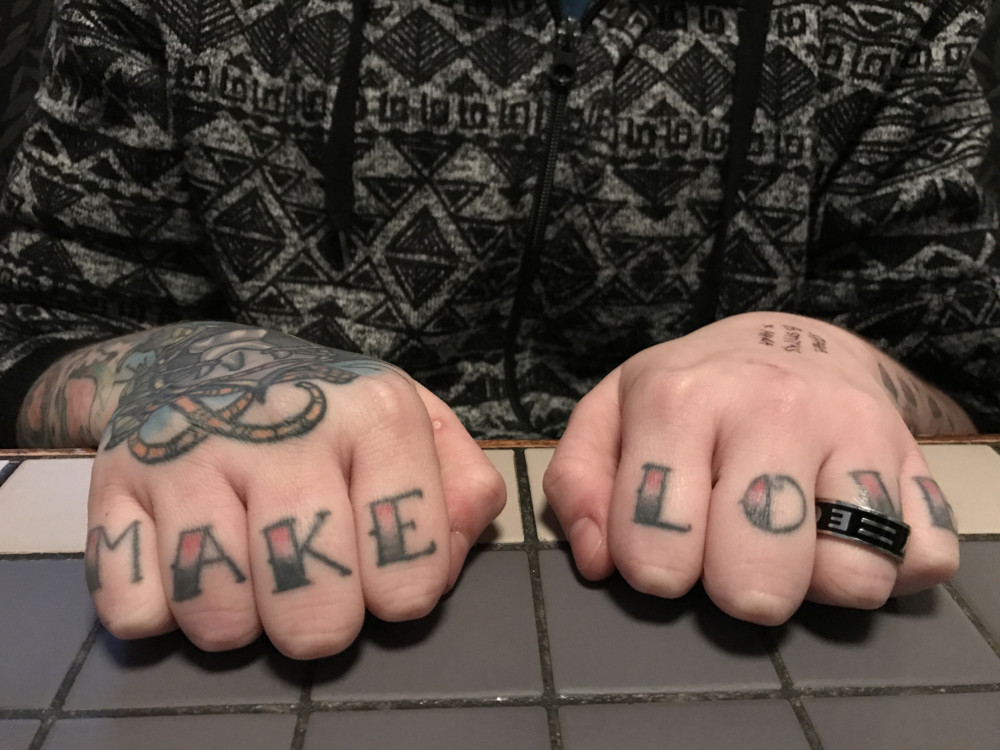By Jerry Davich
Chicago Tribune
WWR Article Summary (tl;dr) Great article by Jerry Davich which introduces us to Mallory Fiegle, owner of “Unity Studio”, a tattoo and piercing shop in Valparaiso. The studio features eclectic apparel, jewelry and fine art created by Fiegle and other artists.
VALPARAISO, Ind.
After meeting Mallory Fiegle, my perception of her was pierced by an old-English idiom: Don’t judge a book by its cover.
In Fiegle’s case, her book-cover appearance can seem a bit intimidating. Her 29-year-old body is covered with more than three dozen tattoos, eight piercings, dark clothing, and two large ear gauges underneath her backward-turned black cap.
Immediately, possibly instinctively, preconceived fears, biases and judgments can seep into anyone’s mind when first meeting her. This happens consistently to her. Stares. Whispers. Finger pointing. She’s seen and heard it all.
Then you open her “book,” turn a few pages and read the first chapters of her life. A different image slowly emerges beyond the tattoos, piercings and body art. It’s softer. Sweeter. Disarming. Initial reactions melt away. Prejudices, too.
Fiegle has a 100-watt smile. A genuine laugh. A friendly disposition. A sweet love story.
Trouble is, how many of us care to turn these proverbial pages in others? How many of us take the time to read past each other’s hard-cover image? How many of us believe it’s simpler and more convenient to instead assess or judge someone at face value?
I’m raising my hand. Did you raise yours?
This is why I knew I had to get to know Fiegle better after first meeting her at Unity Studio, a tattoo and piercing studio in Valparaiso. Last summer, I took my teenage daughter there to get her nose pierced. It was a first for her so, of course, her mother and I were concerned who would be doing the piercing.
In walked Fiegle, who has obviously experienced some serious body modification since her own adolescence. In fact, I learned that she first got started in her early teen years with ear gauges, which date back to our recorded history as a species.
This intrigued Fiegle as a young teen who enjoyed watching “National Geographic” TV shows with her father while growing up in Hobart. The tribal culture of primitive people who still adhered to their body rituals in our day and age fascinated Fiegle.
So much so that she wanted to emulate them.
What was once a rite of passage to show maturity, in both girls and boys, is now more of a fashion statement or cosmetic body expression. Fiegle enjoyed these ancient and modern aspects of ear gauges, which gradually stretched her earlobes, plus other centuries-old body modifications.
She ventured into commonplace ear piercings, as most girls do, and then multiple piercings on her face. Also, numerous tattoos across her body. One led to five, then 20, then 40 in all. Collectively, this look has become her public image, in addition to baggy clothes, a backward cap and eye-catching images on her shirts.
Although she may look like a walking billboard for Unity Studio, Fiegle’s image is who she has become in society. It’s who she is. Same goes with her life partner for nearly a decade, Denise Naparla, who also enjoys sporting body art of various styles.
Their studio, which opened in 2015, is a reflection of their lives, and their love, featuring eclectic apparel, jewelry and fine art created by them and other artists. The store’s motto is “Art, Friendship, Community,” and I’ve found all three aspects there.
However, I wouldn’t have discovered this if I didn’t read past their book-cover images.
Their looks may seem radical to you, but they represent only a small part of our society’s public identity mosaic. And the misperceptions that come with them, based on social norms and taboos, depending how you display your “book.”
For instance, those guys who typically dress like Harley-Davidson bikers, complete with all-black clothing, a branded bandanna and work boots. Or those crisply dressed urban professionals who seemingly walked out of a GQ magazine photo shoot. Or the farmer-looking folks who sport overalls for every occasion.
Do these book-cover images look familiar to you?
If so, do they come with preconceived notions – the macho biker, the metro yuppie, the local yokel? It’s so much easier to label these guys with our prefabricated stereotypes than to actually discover who they are, what they think, what they value, and so on.
Such misperceptions cut across all demographics, including gender, race, occupation and geography. It’s as tribal as it is human. It’s in our social DNA.
I, too, have experienced such knee-jerk judgments based solely on my projected public identity.
For example, I had three strangers ask me in the same week if I had a military background, based strictly how I presented myself to them. I was dumbfounded each time. What? Who? Me? Are you serious?
I consider myself anything but military-minded or, in this case, military looking or acting. Yet two of those people asked what branch of the military I served in. One man, a Best Buy worker who fixed my computer, asked me squarely, “Are you a Marine?”
A U.S. Marine?
I asked that worker why he thought this of me. He just shrugged and said I simply had “that look.” I had no idea. And I’ve been contemplating it ever since. Is this the look I want to project? No, not really.
Which brings me back to Fiegel and her fiance Naparla who, when we first met, pegged me for a straight-laced, sort of uptight kind of guy.
I need to change my book cover. Do you?














































































































































































































































































































































































